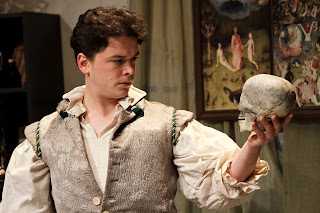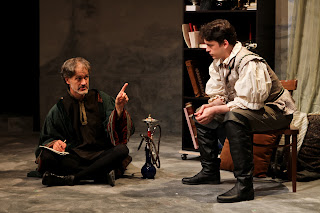Review: Wittenberg by David Davalos. Produced by Seattle Shakespeare Company. Directed by Rita Giomi. With Connor Toms, Chad Kelderman, Michael Patten, Michelle Chiachiere. Now through December 5 at the Center House Theatre at Seattle Center.
 |
| Connor Toms as Hamlet in “Wittenberg”. Photo by John Ulman/Seattle Shakespeare Company |
Playing in repertory with Seattle Shakes’ fantastic production of Hamlet, (see my swoony review of that excellent play, HERE), David Davalos clever and cunning play “Wittenberg” makes an ideal companion for the Shakespearean work. A “prequel” to the events in Hamlet, Wittenberg focuses on Hamlet’s life before the tragedies of that play when he was a normal, confused, but relatively cheerful student at the University of Wittenberg in the German city of the same name. Hamlet is a good kid, though conflicted about both choosing his major and his eventual fate as the King of Denmark. He looks to two mentors he has at the university, both professors and both famous in their own right: Reverend Father Martin Luther and John Faustus, MD, JD, Ph.D, Th.D. Yes, it’s THAT Martin Luther and it’s THAT Dr Faustus and the conceit of having a famous literary creation interact with a REAL famous theologian and another equally famous literary character is what drives this play. In lesser hands, it could be gimmicky and overly twee, but David Davalos has written a sharp, charming play with snappy dialogue, clever and witty constructions and a talent for conveying some deep emotions and philosophical thought but in a language that’s understandable to all. It might help if you’re up on your Shakespeare, your Faust and your history of the Protestant Reformation but it’s not a necessity. Wittenberg is entertaining and thoughtful enough for anyone regardless if they aced senior honors English or slept through it.
But, history and lit scholars shouldn’t go into Wittenberg expecting a literal interpretation of the period which must be dated to the time frame of its only factual character, Martin Luther, who nailed his Ninety-five Theses to the church door in 1517 and which figures as a major plot point in this play. Wittenberg exists in its own anachronistic world that frequently mirrors a contemporary college campus. Dr Faustus is the laid back, hippy dippy professor loved by his students for his tune out/turn on philosophy of life who contrasts sharply with the disciplined nature of his colleague Martin Luther. Yet, Luther and Faustus are friends in this story, obviously on different sides of the religious/philosophical fence but supportive of each other each urging the other to accept the other’s views on life, mortality, faith and ideology. They disagree and they bicker but seem to have genuine affection for one another and one of the more entertaining moments of the play is the joy experienced by Luther after Faustus introduces the priest to the healing laxative benefits of coffee. (Faustus also turns Hamlet onto hash to lift his spirits which leads to a very rambunctious tennis match between Hamlet and his rival Laertes…)
All three characters; Hamlet, Luther and Faustus, are struggling with conflicting emotions about events in their lives they can’t control. Hamlet struggles with his future role as a King; Luther is tormented and vexed by the excesses of the Catholic Church; Faustus loves a woman he helped set free, but she refuses to love him in return and rejects the notions of a traditional relationship as his chattel. By the end of the play, Faustus has set the wheels in motion for the other two to achieve their destinies, for better or worse, but he is still unloved and alone. There is no literal Mephistopheles/Devil character in Wittenberg…Faustus acts as his own personal Mephistopheles, to both himself and the other characters, and the duality of his nature means he can never be completely satisfied in his life. The Devil in him will not allow it.
It’s a smart show with a good script and it’s well directed by Rita Giomi. She keeps the pace briskly moving but wisely allows the play to slow down for the bigger, more dramatic moments. It’s the same set, by Jennifer Zeyl, used for Hamlet with the addition of some handsome set dressing. Costumes, lighting and sound were all well done.
 |
| Chad Kelderman as Faustus and Connor Toms as Hamlet. Photo by John Ulman. |
The acting was especially fine with strong performances by the three men: Connor Toms as Hamlet, Chad Kelderman as Faustus and Michael Patten as Luther, and the one female in the cast, Michelle Chiachiere as four different women in the lives of the three men. Mr Toms has an agreeable All-American charm to him that has stood him well in his career, including a big, splashy role in Book-It’s recent hit production of “Cider House Rules” and he’s very appealing as the earnest young Hamlet. Michael Patten is a seasoned actor at home in Shakespearean roles and while Luther was never an actual character in a Shakespearean play, he certainly was a character cut out of the same bolt of cloth as the great characters in the canon, and Mr Patten is equally good at playing the majesty of Luther as well as the strong humor inherent in the character and the structure of the story. And, Ms Chiachiere was equally good in all four of her roles: a saucy wench, a mercenary prostitute, a Spiritual Vision and an ambassador from the Danish Court and imbued each of them with their own personalities and character tics.
But the star of the show is Faustus, and actor Chad Kelderman clearly relishes playing this role. His Faustus is charming, sneaky, a bit devious, but open hearted and of a generous nature. The eternal Devil’s Advocate, he is a conflicted soul himself and Mr Kelderman nicely plays the character’s inner torment, self-doubt and loneliness. However, it’s a very funny part and an excellent comedic performance from the actor with an ear for the language and nice sense of how to play the physicality of the character. It’s one of my favorite performances of the year.
Who’s this play for? Humanities majors. Theater History majors. Word nerds. I didn’t think “Shakespeare in Love” was the best film of 1998 but it was an enjoyable historical/theatrical romantic comedy and if you liked that film, you’ll enjoy this play. It’s a little darker and it’s not as romantic, but tonally they have similarities.
– Michael Strangeways












